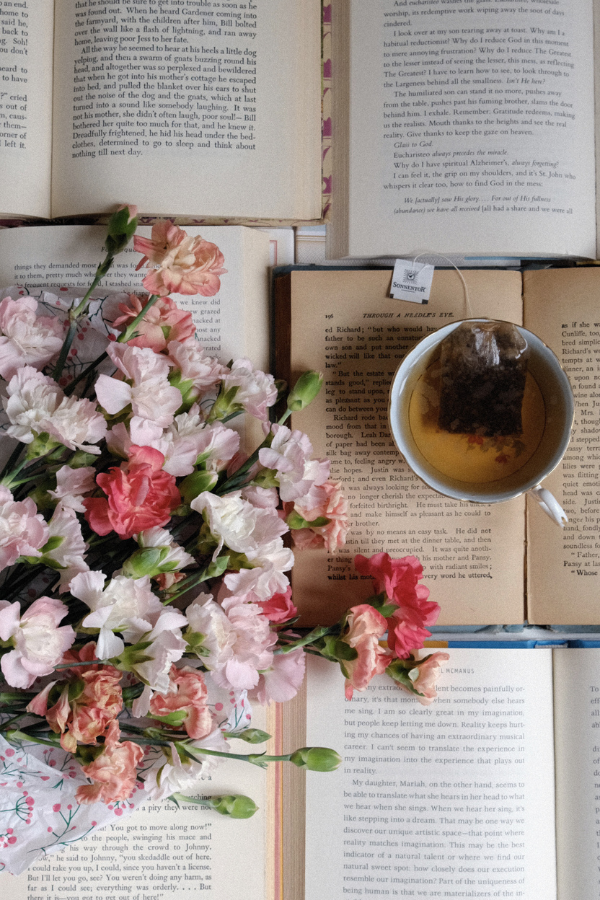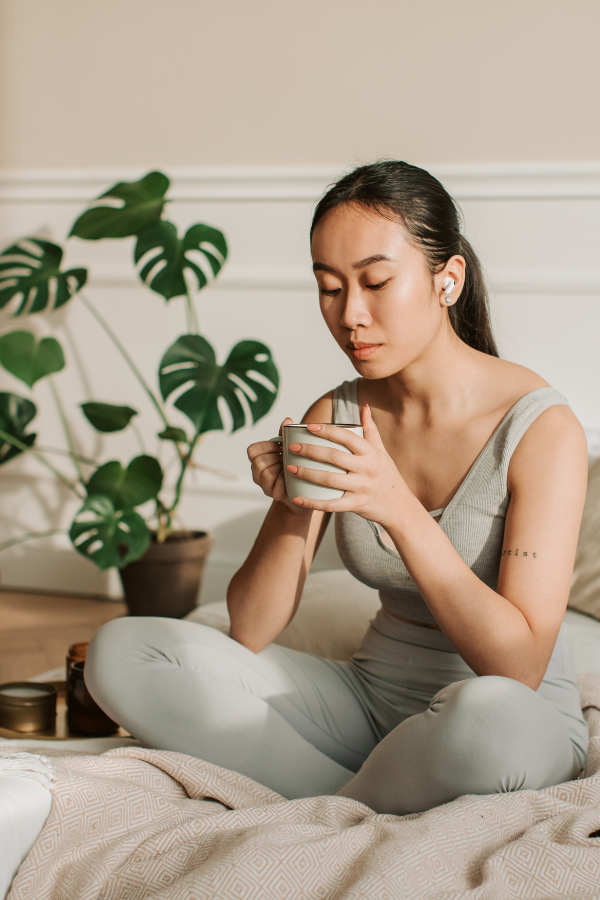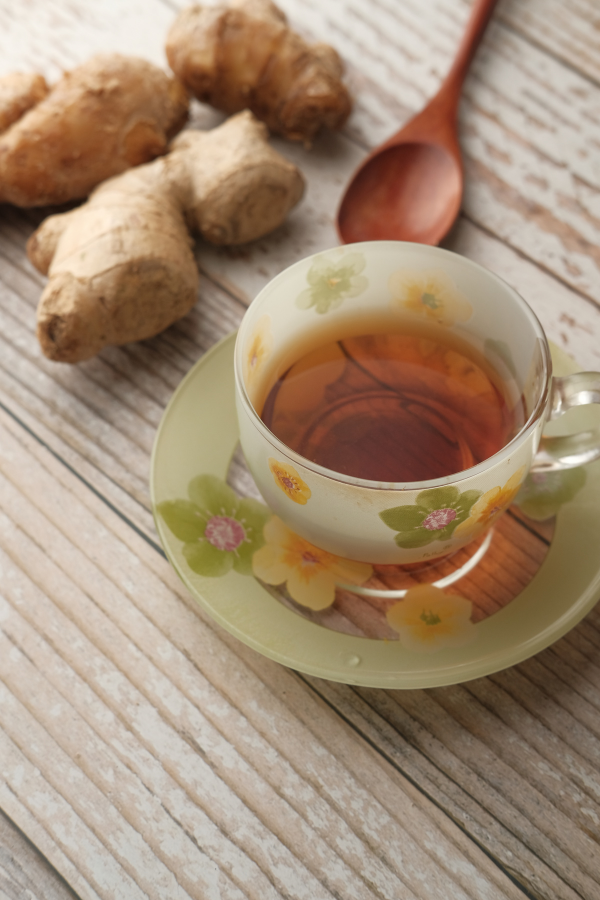
How Does the Soothing Blend of Herbs in Stress Relief Tea Work?
Summary
Stress-relief teas offer a natural way to manage stress, especially for women in creative professions. Ingredients like Chamomile, Lavender, Holy Basil, and Green Tea can help soothe the mind, reduce anxiety, and promote relaxation without hindering creativity. These teas not only provide a momentary pause but also support long-term well-being, making them an essential tool for anyone looking to balance the demands of their creative work with their health.
Reflection Questions
- Which stress-relief tea are you most interested in trying, and why?
- How do you currently manage stress in your creative profession, and in what ways could incorporating tea into your routine enhance your existing practices?
- Reflect on a particularly stressful period in your creative work. How might your experience have changed if you had used stress-relief teas as a coping mechanism?
- Considering the adaptogenic and anti-inflammatory properties of some teas, how do you think integrating these teas into your daily routine could affect your overall health and creativity?
Journal Prompt
Think about the last time you felt overwhelmed by stress in your creative job. Describe the situation and how you felt both physically and emotionally. Now, imagine integrating stress-relief teas into your daily routine during that period. Reflect on and write about how introducing these teas might have altered your stress levels, creative output, and overall well-being. Consider how you can implement this change in your current lifestyle to better manage future stress.
For women in rewarding yet often stress-inducing creative jobs, finding moments of tranquility amidst the whirlwind of creativity and responsibility is essential. Stress-relieving teas offer a natural way to soothe the mind, ignite inspiration, and maintain equilibrium. From the floral serenity of Chamomile and the aromatic embrace of Lavender to the adaptogenic strength of Holy Basil, these teas provide a much-needed pause in your day. Let’s explore how each sip can help take the edge off.
Why Does a Soothing Cup of Stress Relief Tea Actually Work?

Stress relief teas often contain a blend of herbs that are known for their calming and relaxing properties. Of course, it’s important to note that while stress relief teas can be helpful for managing mild stress and promoting relaxation, they may not be sufficient for severe stress or anxiety disorders. In such cases, it’s essential to seek professional medical advice to reduce anxiety. Also, individual responses to each active ingredient in these herbal teas can vary, so what works for one person may not work for another. Still, let’s take a look at the different ways calming teas relieve stress in some people.
Direct Effects on the Brain and Nervous System

The efficacy of stress relief teas in calming the mind and alleviating anxiety can often be attributed to their direct interaction with the brain and nervous system. Herbs like chamomile and lavender are prime examples, believed to enhance the activity of gamma-aminobutyric acid (GABA), a crucial neurotransmitter that facilitates relaxation.
GABA’s role is to inhibit certain brain signals and decrease activity in the nervous system, helping to reduce feelings of anxiety and promote a state of calm. When ingredients in stress relief teas increase GABA activity, they help to naturally calm the mind and reduce the physiological and psychological sensations of stress. This interaction is a key mechanism through which these teas exert their calming effects, providing a gentle and natural way to ease stress and anxiety symptoms.
Adaptogenic Effects
Adaptogens, found in certain stress relief teas, such as Ashwagandha and Holy Basil, are a unique class of herbs that support the body’s ability to de stress effectively. These natural substances work by stabilizing physiological processes and promoting homeostasis, thereby enhancing the body’s resistance to stressors.
By modulating the production and impact of stress hormones like cortisol, adaptogens can mitigate the body’s stress response, reducing the harmful effects prolonged stress can have on the body. This can include improvements in energy levels, sleep quality, and mood stabilization. Adaptogens do not block the immediate stress response; rather, they help the body to adjust and recover from stress, promoting resilience and a healthier stress management capacity over time.
Soothing Properties

The simple act of drinking a warm cup of herbal tea can be inherently soothing, offering a moment of pause and comfort in one’s day. This psychological and physical warmth can foster a sense of tranquility and well-being, which in itself is a powerful stress reliever. Many stress relief teas are intended to promote a good night’s sleep. As such, they are caffeine free. This alone can reduce stress if you are used to consuming caffeinated beverages throughout the day.
Beyond the warmth, many stress relief teas include herbs with mild sedative effects, such as valerian root, which can further promote relaxation and facilitate better sleep. This combination of a comforting ritual and the natural sedative qualities of certain herbs offers a dual approach to reducing stress, making the practice of drinking tea a holistic experience that nurtures both mind and body.
Fuel your creative fire & be a part of a supportive community that values how you love to live.
subscribe to our newsletter
*please check your Spam folder for the latest DesignDash Magazine issue immediately after subscription

Antioxidant Effects
Teas and the herbs they contain are often rich in antioxidants, substances that play a crucial role in protecting the body from oxidative stress. Oxidative stress occurs when there is an imbalance between free radicals and antioxidants in your body, leading to cellular damage. While oxidative stress is primarily a physical condition, its reduction can have significant benefits for overall well-being and can indirectly contribute to stress management.
By neutralizing free radicals, antioxidants in tea help to minimize the damage they can cause, supporting better physical health. This can lead to a sense of increased energy and well-being, which in turn can help individuals handle psychological stress more effectively.
Aromatherapy

Aromatherapy is another aspect through which stress relief teas exert their calming effects. The aroma of herbs such as lavender, lemon balm, or those in the mint family has been shown to have a direct impact on the part of the brain responsible for emotions, the limbic system. These scents can trigger responses that lead to mood enhancement and stress reduction.
Inhaling these aromas while sipping on tea can provide a double dose of relaxation, engaging both the sense of taste and smell in the relaxation process. This multisensory approach can amplify the stress-relieving effects of tea, making aromatherapy an integral part of the experience. The calming properties of these aromas add an additional layer of relaxation to the ritual of tea drinking, showcasing the powerful role of scent in the management of stress and promotion of mental well-being.
Inflammation Reduction

Several ingredients commonly found in stress relief teas also have properties that can help reduce inflammation. Inflammation is a natural response of the body to injury or infection, but chronic inflammation can lead to various health issues and contribute to stress.
For example, turmeric, especially its active component curcumin, is renowned for its potent anti-inflammatory and antioxidant properties. Curcumin helps to minimize inflammation by inhibiting the molecules that play a major role in inflammation processes. It’s often added to teas either for flavor or health benefits, and is more effective when consumed with black pepper, which contains piperine, a substance that enhances the absorption of curcumin.
Ginger contains gingerols, shogaols, and paradols, compounds known for their anti-inflammatory and antioxidative properties. Regular consumption of ginger in tea can help limit inflammation and is commonly used to relieve pain, reduce nausea, and improve immune function.
Green tea is rich in catechins, a type of antioxidant that has been shown to have anti-inflammatory effects. The catechin epigallocatechin gallate (EGCG) in green tea is especially noted for its ability to reduce inflammation and help protect cells from damage.
Chamomile contains several compounds, such as flavonoids, that possess anti-inflammatory properties. It’s often used in herbal teas for its calming effects, and its ability to reduce inflammation can further aid in alleviating symptoms of stress.
Holy Basil, also known as Tulsi, is an adaptogen with anti-inflammatory and antioxidant effects. When incorporated in your daily routine, it can help reduce inflammation while also managing the stress response, making it a multifunctional herb in the context of stress and inflammation. Peppermint has menthol, which is soothing and can help relieve sore throats and reduce inflammation. This drink tastes great but is also beneficial for digestive inflammation and discomfort.
Popular Stress Relief Teas to Try

These teas offer a natural way to support relaxation and stress relief. It’s always a good idea to start with small amounts to see how your body responds. Some of these herbs can interact with medications or have side effects, so if you have any health conditions or are pregnant or breastfeeding, it’s wise to consult a healthcare provider before incorporating them into your routine.
Chamomile Tea

One of the most popular herbal teas for relaxation and sleep, chamomile is known for its calming effects. It is believed to act on the same brain receptors as drugs like Valium, helping to reduce anxiety and promote better sleep.
Peppermint Tea
Peppermint is not only refreshing but also has a soothing effect on the body and mind. It can help relieve digestive issues related to stress and is often used to promote relaxation.
Lavender Tea
Known for its aromatic and soothing properties, lavender tea can help to reduce stress, alleviate anxiety, and promote sleep. The scent of lavender alone is often enough to help some people feel more relaxed.
Valerian Root Tea
Often used as a natural remedy for insomnia, valerian root can help to improve sleep quality and reduce the time it takes to fall asleep. It has sedative properties that make it effective in promoting relaxation and reducing anxiety.
Lemon Balm Tea

Lemon balm (Melissa officinalis), a member of the mint family, has a mild sedative effect and can help to improve mood and reduce anxiety. Drinking lemon balm tea can promote a sense of calm and well-being.
Holy Basil (Tulsi) Tea
Tulsi, or Holy Basil, is an adaptogenic herb that helps the body adapt to stress and promotes mental balance. It is revered in Ayurvedic medicine for its ability to reduce stress and improve overall wellness.
Passionflower Tea
Passionflower is another herb that has been traditionally used to alleviate anxiety and improve sleep. It increases levels of gamma-aminobutyric acid (GABA) in the brain, which helps to calm the nervous system.
Ashwagandha Tea
Ashwagandha is a powerful adaptogen that can help the body manage stress more effectively. It’s known to lower cortisol levels, improve stress resilience, and promote a more balanced mood.
Ginger Tea

Besides its numerous digestive benefits, ginger tea can help relieve stress due to its warming properties and anti-inflammatory effects. It’s also known to improve blood circulation and relieve physical tension.
Final Thoughts on Stress Relief Tea and Its Many Benefits

Including teas like Chamomile, Ginger, or Ashwagandha in your daily routine can be a simple yet effective step towards better well-being. They help you find calm, boost your energy when needed, and maintain focus on your creative work. Remember, taking care of your mental and physical health isn’t just about doing better work. It’s about living a fuller, more balanced life. Whether you’re hitting a deadline or seeking inspiration, a cup of tea might just be the perfect companion to help you stay centered and creative.
Design Dash
Join us in designing a life you love.
10 Design-Forward Menorahs for a Meaningful (and Artful) Hanukkah
Enjoy ten design-forward menorahs that combine ritual and artistry. These objects feel meaningful, intentional, and at home year-round.
5 Designer-Approved Christmas Trees to Inspire Your Holiday Decorating
LIKE 2 LEAVE COMMENT 0 6 min read SummaryThe most compelling Christmas trees don’t focus on chasing trends or achieving perfection; instead, context is key. These five designer-approved trees show how scale, materials, setting, and personality can shape holiday decorating that feels intentional, expressive, and true to its environment, whether playful, restrained, lived-in, or theatrical.…
11 Christmas Paintings to Put You in the Holiday Spirit This Year
Explore 11 Christmas paintings that celebrate the beauty, traditions, and emotions of this festive, fun, and meaningful holiday season.
Styling Spaces Seasonally for Evergreen Portfolio Content + Of-the-Moment Marketing
Learn how interior designers can style spaces seasonally to create both evergreen portfolio images and timely marketing content.
Counting Down Our Most Listened-To Episodes of 2025: Brittny Button
Learn why our conversation with Brittny Button became one of the DesignDash Podcast’s most listened-to episodes of 2025.
10 Finn Juhl Furniture Pieces That Embody Danish Modern Design
As evidenced by these 10 iconic Finn Juhl furniture pieces, he exemplified Danish Modernism through sculptural forms and architectural angles.








